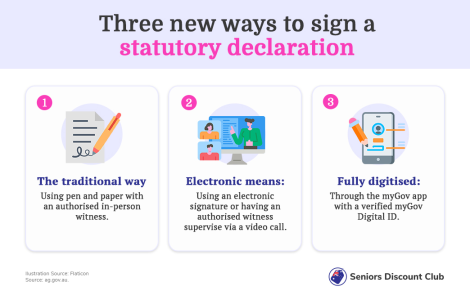Statutory declarations finally go digital, says government
- Replies 11
A statutory declaration is a legally binding document comprising a written statement affirming the truth of a matter, which must be validated by an authorised witness. These declarations serve various purposes, including:
That is why Federal Attorney-General Mark Dreyfus passed a law enabling the permanent use of digital execution, electronic signatures, and video-link witnessing for creating statutory declarations.
People will also have the option to digitally execute a statutory declaration using myGov and the myGov ID Digital ID.

The new digital declarations also require that 'approved online platforms and identity services demonstrate they comply with privacy laws and have robust fraud and security arrangements'.
This means that data-hoarding by tech companies to mine declarations is now strictly prohibited.
'The Bill also prohibits approved online platforms from retaining copies of statutory declarations, noting that they can hold particularly sensitive personal information. There is also an annual reporting requirement to the Parliament on the operation of the online execution platform,' a statement from Dreyfus said.
Australians reportedly dedicate an estimated 9 million hours annually to the execution and processing of over 3.8 million statutory declarations. Traditionally, these documents have been strictly paper-based, requiring in-person witnessing and ink signatures.
The move to allow digital statutory declarations paves the way for other jurisdictions to adopt identical standards. By doing so, it mitigates the risk of varying rules across different states that fail to inter-operate with each other.
This is especially crucial in areas like health and social services, where people often have their affairs managed on their behalf.
The government says this could save over $156 million a year. What's even better is how quickly and easily electronic processes can be done now. This means that services can be delivered much faster without waiting for days or weeks to get paperwork moving.
Another crucial part of the new law is that it considers the upcoming widespread use of digital ID credentials. This ensures that electronic signatures and official declarations will remain valid in the future.
For those who prefer the traditional paper-and-ink method, don't worry; the bill does not remove the option for Australians to continue making statutory declarations on paper if they prefer to do so.
For more information on how to complete a statutory declaration, click here.

So, what do you think of the news, members? Do you think this bill is a step in the right direction? And do you believe other important government documents and transactions should also be digitised to reduce time and effort? Share your thoughts in the comments section below.
- confirming personal information,
- addressing financial concerns, and
- dealing with health-related matters.
That is why Federal Attorney-General Mark Dreyfus passed a law enabling the permanent use of digital execution, electronic signatures, and video-link witnessing for creating statutory declarations.
People will also have the option to digitally execute a statutory declaration using myGov and the myGov ID Digital ID.

Commonwealth statutory declarations will officially join the digital age when the federal government changes the centuries-old practice of paper-and-ink. Credit: Shutterstock.
The new digital declarations also require that 'approved online platforms and identity services demonstrate they comply with privacy laws and have robust fraud and security arrangements'.
This means that data-hoarding by tech companies to mine declarations is now strictly prohibited.
'The Bill also prohibits approved online platforms from retaining copies of statutory declarations, noting that they can hold particularly sensitive personal information. There is also an annual reporting requirement to the Parliament on the operation of the online execution platform,' a statement from Dreyfus said.
Australians reportedly dedicate an estimated 9 million hours annually to the execution and processing of over 3.8 million statutory declarations. Traditionally, these documents have been strictly paper-based, requiring in-person witnessing and ink signatures.
The move to allow digital statutory declarations paves the way for other jurisdictions to adopt identical standards. By doing so, it mitigates the risk of varying rules across different states that fail to inter-operate with each other.
This is especially crucial in areas like health and social services, where people often have their affairs managed on their behalf.
The government says this could save over $156 million a year. What's even better is how quickly and easily electronic processes can be done now. This means that services can be delivered much faster without waiting for days or weeks to get paperwork moving.
Another crucial part of the new law is that it considers the upcoming widespread use of digital ID credentials. This ensures that electronic signatures and official declarations will remain valid in the future.
For those who prefer the traditional paper-and-ink method, don't worry; the bill does not remove the option for Australians to continue making statutory declarations on paper if they prefer to do so.
For more information on how to complete a statutory declaration, click here.
Key Takeaways
- Federal Attorney-General Mark Dreyfus has established the permanent legal ability to use digital execution, electronic signatures, and video-link witnessing to create statutory declarations.
- The new system obligates that approved online platforms and identity services comply with privacy laws and establish sturdy fraud and security arrangements.
- This digital change is reportedly significant as it could permit other jurisdictions to replicate the same standards, preventing the chance of differing rules for different states.
- The bill accommodates the forthcoming mainstream launch of digital identity credentials, future-proofing e-signatures, and statutory declarations. It permits people to digitally create a statutory declaration using myGov and myGov ID Digital ID platforms but also retains the option for traditional paper-based declarations.
So, what do you think of the news, members? Do you think this bill is a step in the right direction? And do you believe other important government documents and transactions should also be digitised to reduce time and effort? Share your thoughts in the comments section below.








